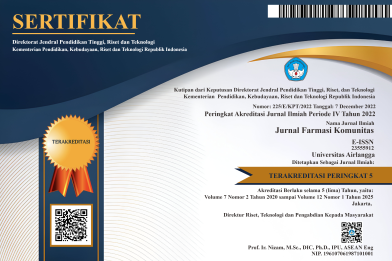Penerapan Layanan Telefarmasi oleh Apoteker di Apotek Wilayah Surabaya pada Masa Pandemi COVID-19
Downloads
Pandemi COVID-19 yang terjadi di Indonesia menyebabkan berbagai perubahan, salah satunya yaitu segi pelayanan kefarmasian di apotek. Pada kondisi pandemi COVID-19, apoteker dituntut tetap melakukan pelayanan kefarmasian secara profesional, yaitu melalui pelayanan telefarmasi. Namun, tidak semua apotek, khususnya di Kota Surabaya, melakukan pelayanan telefarmasi dalam melaksanakan pelayanan kefarmasian. Dengan banyaknya faktor yang kemungkinan mempengaruhi pelaksanaan telefarmasi, maka penelitian ini bertujuan untuk mengetahui penerapan layanan telefarmasi di apotek kota Surabaya. Penelitian ini merupakan penelitian cross-sectional dengan metode pengambilan sampel accidental sampling dengan kriteria inklusi yaitu apoteker yang berpraktek kerja di apotek di wilayah Kota Surabaya. Terdapat 58 responden yang berpartisipasi dalam penelitian ini. Sebagian besar responden memiliki pengetahuan yang baik terhadap telefarmasi yang ditunjukkan oleh 97,9% pertanyaan telah terjawab dengan benar. Sebanyak 45 responden (77,6%) telah menerapkan pelayanan telefarmasi. Penelitian ini menunjukkan bahwa penerapan telefarmasi lebih dipengaruhi oleh berbagai hambatan dalam melakukan layanan telefarmasi daripada tingkat pengetahuan telefarmasi yang dimiliki oleh responden. Hambatan terbanyak yang dimiliki oleh responden yang telah menerapkan layanan telefarmasi yaitu kesulitan dalam mengidentifikasi atau menilai kondisi pasien (73,3%). Sedangkan hambatan terbanyak yang menyebabkan responden belum menerapkan layanan telefarmasi yaitu kekhawatiran responden terkait informasi obat yang tidak tersampaikan dengan baik dan benar (53,8%). Apoteker di wilayah Kota Surabaya telah memiliki pengetahuan yang baik terhadap telefarmasi. Sehingga, banyak dari apoteker tersebut telah menerapkan telefarmasi. Hambatan dalam penerapan telefarmasi dialami oleh apoteker yang menerapkan telefarmasi dan yang belum menerapkannya.
Ameri, A., Salmanizadeh F., Keshvardoost, S., and Bahaadinbeigy, K. (2020) ‘Investigating pharmacists' views on telepharmacy: Prioritizing key relationships, barriers, and benefits.', Journal of Pharmacy Technology. 36(5), pp. 171-178. doi:10.1177/8755122520931442
Arcanggih, J. D., Kertahardi., & Riyadi. (2014) ‘Implementasi E-commerce sebagai media promosi dan penjualan secara elektronik (studi kasus pada toko Jumbo Cell Bangil).', Jurnal Administrasi Bisnis, 14(1), pp. 1-10.
Baroroh, F. and Darmawan, E. (2016) ‘Evaluasi implementasi pelayanan konseling obat di apotek Kota Yogyakarta', Farmasains, 3(1), pp. 13 - 19.
BPOM. (2020) Peraturan Badan Pengawas Obat dan Makanan Nomor 8 Tahun 2020 tentang Pengawasan Obat dan Makanan yang Diedarkan Secara Daring. Jakarta: BPOM RI
Fiorillo, A. and Gorwood, P. (2020) ‘The consequences of the COVID - 19 pandemic on mental health and implications for clinical practice', European Psychiatry, 63(1), pp. 1 - 2. doi: 10.1192/j.eurpsy.2020.35
Hendarsyah, D. (2012). Keamanan layanan internet banking dalam transaksi perbankan. IQTISHADUNA: Jurnal Ilmiah Ekonomi Kita, 1(1), pp. 12-33. doi: 10.46367/iqtishaduna.v1i1.2
Hootsuite. (2021) Indonesian digital report 2021. We are social Ltd. viewed 10 Oktober 2021 https://datareportal.com/reports/digital-2021-indonesia
Iftinan, G. N., Wathoni, N., and Lestari, K. (2021) ‘Telepharmacy: A potential alternative approach for diabetic patients during the COVID-19 pandemic.', Journal of Multidisciplinary Healthcare. 2021(14), pp. 2261-2273. doi: 10.2147/JMDH.S325645.
Iftinan G. N, Elamin K. M., Rahayu S. A., Lestari K., and Wathoni N. (2023) ‘Application, benefits, and limitations of telepharmacy for patients with diabetes in the outpatient setting.', Journal of Multidisciplinary Healthcare, 2023(16), pp. 451-459. doi: 10.2147/JMDH.S400734.
Jindasook, C. (2020). Exploring drivers and barriers towards utilizing telepharmacy among pharmacists in Bangkok. Thesis. Nakhon Pathom: Mahidol University
Kemenkes RI. (2016) Peraturan Menteri Kesehatan Republik Indonesia Nomor 73 Tahun 2016 tentang Standar Pelayanan Kefarmasian di Apotek. Jakarta: Kemenkes RI.
Kemenkes RI. (2020) Pedoman Pencegahan dan Pengendalian Coronavirus Disease (COVID 19). Jakarta: Kemenkes RI.
Lebl, A., Mitić D., Georgiev, A. M., and Lebl-Antonić, D. (2017) ‘Application of telepharmacy: importance of a pharmacy technicians' Role', Scientific Technical Review, 67(1), pp.54-60. doi: 10.5937/STR1701054L
Monaghesh, E. and Hajizadeh, A. (2020) ‘The role of telehealth during COVID-19 outbreak: A systematic review based on current evidence.', BMC Public Health, 20(1). doi:10.1186/s12889-020-09301-4.
Mongi, D., Pareta, D., Maarisit, W., and kanter, J. (2020) ‘Evaluasi pelaksanaan pelayanan kefarmasian di apotek telemedika farma 14 manado', biofarmasetikal tropis.', The Tropical Journal of Biopharmaceutical, 3(2), pp. 65–71. doi: 10.55724/j.biofar.trop.v3i2.286.
Muflih, S. M., Al-Azzam, S., Abuhammad, S., Jaradat, S.K., Karasneh, R., and Shawaqfeh, M. S. (2021) ‘Pharmacists' experience, competence and perception of telepharmacy technology in response to COVID-19.', International Journal of Clinical Practice, 75(7). doi:10.1111/ijcp.14209
Patel, K. (2021) ‘Assessment of knowledge, attitude, perception of pharmacy students towards telepharmacy.', Applied Research Project, 75. doi: 10.21007/chp.hiim.0072
Poudel, A., & Nissen, L. M. (2016) ‘Telepharmacy: a pharmacist's perspective on the clinical benefits and challenges.', Integrated Pharmacy Research & practice, 2016(5), pp. 75–82. doi: 10.2147/IPRP.S101685.
Rindayati, Nasir, A., and Astriani, Y. (2020) ‘Gambaran Kejadian dan tingkat kecemasan pada lanjut usia.', Jurnal Kesehatan Vokasional, 5(2), pp. 95 - 101. doi: 10.22146/jkesvo.53948
Rustiani E., Wulandari, C., Nhestricia, N., Andini, S., Handayani M. T. R., Rikkit, Indriati, D., Gunawan, D. O., Elfrida, N. S. A. L. and Kusuma, E. N. P., (2021) ‘Swamedikasi selama pandemi covid - 19: sosialisasi dan edukasi di posyandu rajawali Kelurahan Atang Sendjaya, Kabupaten Bogor.', Prosiding, 2(2), pp. 276 - 282.
WHO, 2020. The Impact of The COVID - 19 pandemic on noncommunicable disease resources and services: results of a rapid assessment. Geneva: World Health Organization.
Website Resmi Informasi COVID-19 (2021) viewed 17 September 2021. https://covid19.go.id/
Copyright (c) 2023 Jurnal Farmasi Komunitas

This work is licensed under a Creative Commons Attribution-NonCommercial-ShareAlike 4.0 International License.
In order to be accepted and published by JFK, author(s) submitting the article manuscript should complete all the review stages. By submitting the manuscript, the author(s) agreed to these following terms:
1. Copyright of the article is transferred to the journal (JFK), by the knowledge of the author, whilst the moral right of the publication belongs to the author. The intended copyright includes the rights to publish articles in various forms (including reprints). JFK maintain the publishing rights to the published articles.
2. The formal legal aspect of journal publication accessibility refers to the Creative Commons Attribution-Non-Commercial-Share Alike (CC BY-NC-SA), which implies that the publication can be used for non-commercial purposes in its original form.
3. Every publication (print/electronic) is open access for educational, research, and library purposes. In addition to the objectives mentioned above, the editorial board is not responsible for copyright infringement
The Copyright Transfer Agreement Form can be downloaded ON THIS FORM.

Jurnal Farmasi Komunitas (JFK) by Unair is licensed under a Creative Commons Attribution-NonCommercial-ShareAlike 4.0 International License.








